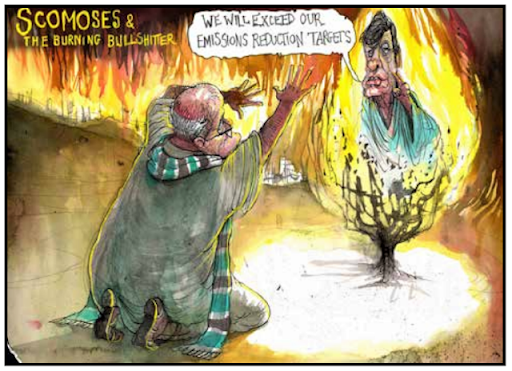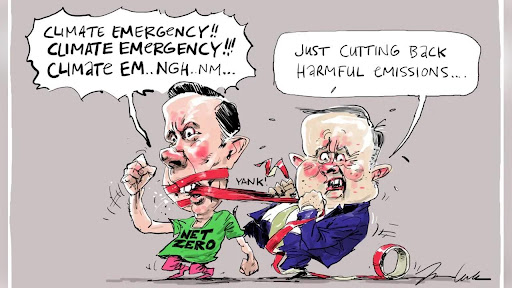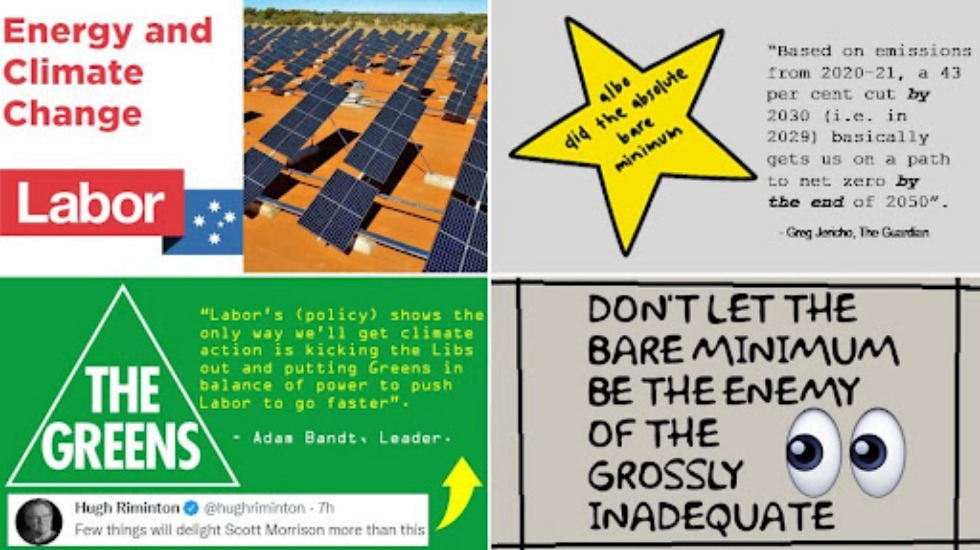Labor tried for a political fix with Friday’s climate policy. Critics pounced, but did they have a choice? Images (clockwise from top left): ALP, Greg Jericho (quoted), Jon Kudelka (quoted), Australian Greens (inset: Twitter, @hughriminton).
It’s telling that Labor launched its long-awaited climate policy on a languid Friday afternoon, following the annual airport stampede that marks the end of Parliament for the year.
They plainly didn’t want a lot of scrutiny of their launch, deploying what’s known as the “Friday news dump” as Australia turned its collective attention to the weekend.
Neither Labor nor the coalition seem that invested on climate. After Opposition Leader Anthony Albanese adopted his ‘small target’, bare minimum emissions approach on Friday, Prime Minister and global climate pariah Scott Morrison went on a ‘hot lap’ around Mount Panorama to celebrate the emissions orgy sometimes known as the Bathurst 1000.
Climate and the environment should be a winning cause for Labor, given the other side’s ambivalent flimflammery on an issue of vital importance to our future and that of the planet. Yet it’s been redefined in the eyes of many punters as a “what’s in it for me?” question, thanks to a very effective messaging machine on the right.
“Retrain for a green energy job after 20 years as a coal miner? Sounds like hard work!”
“Trade in my muscle car for a Prius? You’ve got to be kidding, right?”
As a result, Labor’s policy rollout was, well, modest. Here are five things you should know about it:
1. A 43 per cent cut in emissions for the period 2005-2030, enforced through an existing safeguard mechanism, which will cap the emissions of large-scale polluters in resources and industry;
2. Sixty-four thousand new jobs (and a further 540,000 indirectly) driven primarily by a $20 billion upgrading of the electricity grid;
3. New transmission links to seamlessly transfer power from large-scale solar, wind and batteries in regional areas, and $300m for community batteries and shared solar banks;
4. Up to $3 billion from Labor’s National Reconstruction Fund to invest in green metals (steel, alumina and aluminium), clean energy component manufacturing, hydrogen electrolysers and fuel switching, agricultural methane reduction and waste reduction.
5. Cheap, clean energy forecast to, on average, cut power bills by $275 by 2025.

Cartoon: David Rowe, Financial Review.
Forty-three per cent is kind of tepid, but it could be worse. The LNP government’s ‘Plan’ wants to reduce our annual emissions by a whole one per cent a year through to 2030, describes liquified natural gas – a fossil fuel – as ‘clean’ and is pinning its hopes on carbon capture technology that hasn’t even been invented.
Coupled with Morrison’s self-inflicted black eye at the COP 26 climate change conference in Glasgow last month, and his earlier flirtation with pulling out of the Paris climate agreement, the government has established itself as an international emissions pariah. Labor had something of a subterranean bar to clear, but I guess it did so comfortably.
Why didn’t Albanese go much further than that? Put simply, Labor’s handling of climate policy has contributed to every one of its last three election losses – especially the most recent one, in 2019.
Perhaps you’ll recall this Prime Ministerial gem on electric vehicles (EVs) from the 2019 campaign: “Bill Shorten wants to end the weekend.” Notwithstanding his recent ‘conversion’ on EVs, Morrison is committed to yet another dishonest scare campaign on coal jobs, charging stations and, well, whatever works to stymie Labor’s vote.
“Before Labor even revealed its (policy on Friday) Morrison was limbering up in the Parliament, dusting off one of the coalition’s favourite refrains,” Katharine Murphy wrote in The Guardian.
“If you vote for Albanese next year, you’ll get a Labor/Greens coalition. Spooky. Kooky. Scary.”
It wouldn’t have mattered what Labor announced on Friday; Morrison was always going to take this pernicious but profitable route. Right on time, Greens leader Adam Bandt obliged the PM with some handy bulletin board material: “The only way we’ll get climate action is kicking the Liberals out and putting Greens in balance of power to push Labor to go further and faster,” he wrote.
Labor’s ‘small target’ approach – announcing more ambitious emissions targets than the government’s, hopefully without frightening the horses – is smart politics, minimising Morrison’s lines of attack. Without going ‘too far’, it puts space between Labor and its climate leper of an opponent, while spruiking jobs and much-needed infrastructure investment.
Heck, it’s even backed by economic analysis, something Bill Shorten could have done with last time.

Cartoon: Johannes Leak, The Australian
There’s one major problem with Labor’s ‘smart politics’: from a climate change point of view, it’s just not good policy. More and more, it seems, smart politics and good policy can’t get on the same page.
Under the Paris Agreement of 2015, Australia and other countries are obliged to keep global temperature rises since pre-industrial times (PITR) to well under two degrees Celsius (2C). Failure to do so by as little as half a degree is forecast to exacerbate disastrous sea level rises, unprecedented summer heatwaves, out-of-control bushfires of the kind we experienced in 2019, further bleaching of the Great Barrier Reef, flooding rains, turbocharged storms, harder-to-grow crops and burgeoning health threats.
PLEASE HELP US CONTINUE TO THRIVE BY BECOMING AN OFFICIAL FOOTYOLOGY PATRON. JUST CLICK THIS LINK.
No pressure, right? The next two paragraphs are my layman’s attempt to explain the mathematics of this threat (skip it if you must, but this is important).
Rates of temperature rise and carbon dioxide (CO2) emission are better indicators of where we are on preventing the aforementioned climate calamities than the simple goal of net zero by 2050. A 50 per cent emissions cut by 2030 would have been far preferable to Labor’s goal, giving us a fighting chance of keeping the eventual net PITR well below 2C, as Paris intended.
Labor’s 43 per cent cut means that, to keep PITR under 2C, we’ll have to radically slash emissions after 2030 – on a timetable that achieves net zero by 2041, not 2050 – because we kicked the can down the road and will have pumped too much climate warming CO2 into the air by the end of the decade. “It means the hard work is going to need to be done later,” Greg Jericho of The Guardian wrote.
Try explaining the above to your average, attention-span-of-a-gnat voter. No wonder the public largely ignores the scientists, throws up its collective hands and leaves the decision-making to politicians, bureaucrats and fossil fuel lobbyists with little, if any, interest in getting Joe or Josephine Public to do those hard yards.
Labor’s policy is almost literally the bare minimum we can do, and it leaves an anorexic pathway to meeting our Paris obligations (will we have a collective epiphany and slash our emissions after 2030? Good luck with that). It’s significantly better than the LNP’s stance, but offering something preferable to the policies of global persona non grata Scott Morrison isn’t exactly the hallmark of courage.
‘Smart politics’ has to be something more than a means to power: elections have consequences, not just for our society, but for the planet itself. Other countries may not pull their weight in other parts of the world, but that doesn’t excuse us from fixing our little corner of it.
Comedian Lewis Black’s denunciation of the two-party system in America (above) is every bit as valid here. Video clip: HBO.
Current affairs tragics like yours truly often default to analysing an issue in terms of who won the political game: who seized ‘the narrative’, who captured the all-important ‘swinging voter’. But when we’re on an environmental cliff’s edge, changing how we look at things might be, y’know, a fair idea.
If net zero and rising temperatures are to be meaningfully addressed, we have to move beyond politics as usual. Next year, voters will have a choice between what Black would call Labor’s “really bad idea”, that barely keeps us within striking distance of our Paris obligations, and an “even shittier” LNP government with pretty well no plan at all.
Michael Pascoe thinks a better way to meet our Paris obligations is to take decision-making away from our hopelessly flawed, easily-influenced politicians. “We need to take the same leap on climate policy that we did on monetary policy: establish an independent expert body with the power to act at a credible distance from the political cycle,” Pascoe wrote in The New Daily.
It’s a tantalising idea, but can anyone realistically see today’s power-obsessed politicians (and the donors who rely on their compromised decision-making) giving up a chunk of that power for (cough) the common good? Like Gollum and his “precious” Ring of Power, the addiction is near-unbreakable.
Perhaps the solution – within our lifetimes at least – is to upset the established order with more Green and independent members of parliament, committed above all to the environment.
Already there’s a loose lower house crossbench alliance of four – independents Andrew Wilkie, Helen Haines and Zali Steggall, plus Bandt – whose numbers could be bolstered next year by Zoe Daniel (Goldstein, Victoria), Linda Seymour (Hughes, NSW), Allegra Spender (Wentworth, NSW), Kylea Tink (North Sydney, NSW) and yet-to-be-announced candidates for Kooyong (Victoria), Hume (NSW) and MacKellar (NSW).
Note these would-be independent MPs are all running in electorates traditionally regarded as ‘blue ribbon’ LNP. Were all to get up (or even most), Scott Morrison’s tenure in The Lodge would pretty well be over.
As Bandt explained above, the idea is to have Greens and independents with the balance of power, leveraging a minority Labor government to “go further and faster”, as he put it. A large chunk of Morrison’s coalition is so embedded with the fossil fuel lobby, that support from these independent and Green crossbenchers for a minority LNP government is pretty well inconceivable.
For this to happen, Labor’s current strong lead in the polls would need to slump, most likely on the back of the very scare tactics Morrison will deploy in the months ahead: “Beware a Labor/Greens coalition. Spooky. Kooky. Scary,” as Katharine Murphy put it.
It would be peak irony if the PM’s demagoguery inadvertently produced the optimal net zero, Paris-friendly outcome.
What Labor offers on net zero and our Paris obligations don’t cut it in my book. I don’t live in one of those seats targeted by like-minded independents, so it’s the Greens for mine.
Don’t worry, Albo. You know you’ll get my preferences.











